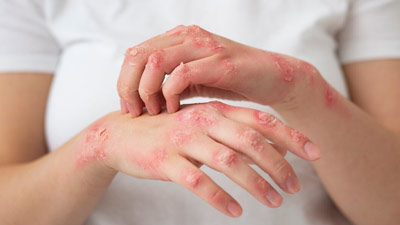
Psoriasis, a chronic skin condition can result in dry scalp patches causing itching, swelling, discomfort, and pain. While there is no cure for psoriasis, however, there are some effective management strategies to manage the symptoms associated with it. This is where essential oils fit rightly. These oils are often used in skin care for their potential therapeutic and cosmetic benefits. We spoke to Dr Rashmi Shetty, Cosmetic Dermatologist, Ra Skin and Aesthetics, Mumbai and Hyderabad, who explained psoriasis, its causes, and the role of essential oils in managing this condition.
Table of Content:-

“Psoriasis is a chronic autoimmune skin condition characterised by the rapid buildup of skin cells, leading to the formation of thick, red patches covered with silvery scales. It is a non-contagious disorder that can affect various parts of the body,” informed Dr Shetty.
According to the Cold Spring Harbor Perspectives In Medicine, the prevalence of the disease is higher in adults (0.91-18.5%) than in children (0.0-2.1%), with two peaks of incidence at approximately 30–39 and 60 years old.
Causes Of Psoriasis
While the exact cause of psoriasis is not fully understood, Dr Shetty listed the possible reasons for it as:
Genetic Factors
There is a strong genetic component to psoriasis. People who have a family history of the illness are more likely to develop this condition. “Certain genetic factors may influence the immune system, making the skin more prone to inflammation and abnormal cell growth,” informed Dr Shetty.
Immune System Dysfunction
Psoriasis is considered an autoimmune disorder as the immune system unintentionally targets healthy skin cells. Dr Shetty said, “In a normal immune response, white blood cells (T cells) are activated to protect the body against foreign invaders. In psoriasis, these T cells become overactive and trigger an inflammatory response in the skin, leading to the rapid production of new skin cells.”
Also Read: Dry Scalp On Your Body? Expert Explains Impact Of Psoriasis And Importance Of Early Detection
Environmental Triggers
Psoriasis symptoms can be triggered due to various environmental factors. Common triggers include infections, stress, injury to the skin (cuts or sunburns), and certain medications.
Lifestyle Factors
Dietary and lifestyle decisions are also very important when diagnosed with psoriasis. Therefore, keeping an eye on your food intake is crucial.
Treating Psoriasis

“The treatment of psoriasis aims to alleviate symptoms, reduce inflammation, and slow down the rapid skin cell turnover associated with the condition”, highlighted Dr Shetty.
It's important to note that there is no cure for psoriasis, but various treatment options can help manage and control the symptoms. The choice of treatment depends on the severity of the condition, the affected areas, and individual factors.
Also Read: Psoriasis Diet Recommendations: Expert Lists Foods To Eat And Avoid
Role of Essential Oils In Treating Psoriasis

Essential oils are concentrated plant extracts containing the natural aroma and beneficial properties of the plant. In the case of psoriasis, essential oils are sometimes considered as complementary or alternative therapies for managing the symptoms. Some essential oils may offer benefits in soothing the skin, reducing inflammation, and providing relief from symptoms.
Dr Shetty listed how psoriasis can be used in managing psoriasis as follows:
Anti-Inflammatory Properties
Many essential oils possess anti-inflammatory properties that can help reduce redness, swelling, and inflammation associated with psoriasis. Examples include:
- Lavender oil
- Chamomile oil
- Tea tree oil
Moisturising and Hydrating

Some essential oils can help moisturise and hydrate the skin, which is beneficial for individuals with psoriasis, as dry skin is a common symptom. Examples include:
- Jojoba oil
- Coconut oil
- Argan oil
Anti-Itch and Soothing Effects
Essential oils are packed with calming and soothing properties that may help alleviate itching and discomfort. Examples include:
- Peppermint oil
- Eucalyptus oil
- Calendula oil
Promoting Skin Healing
Some essential oils are believed to support skin healing and regeneration, potentially assisting in the recovery of psoriasis-affected areas. Examples include:
- Helichrysum oil
- Myrrh oil
Bottomline
Dr Shetty concluded, “While essential oils may offer relief for some individuals with psoriasis, they should not be used as a substitute for medical treatment. It is important to consult a professional dermatologist to develop a comprehensive and effective therapy for psoriasis.”
[Disclaimer: This article contains information provided by an expert and is for informational purposes only. We advise you to not substitute this information with medical treatment and to reach out to your expert to avoid further complications.]
Also watch this video
How we keep this article up to date:
We work with experts and keep a close eye on the latest in health and wellness. Whenever there is a new research or helpful information, we update our articles with accurate and useful advice.
Current Version